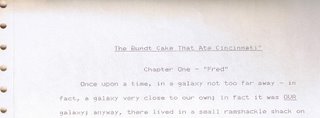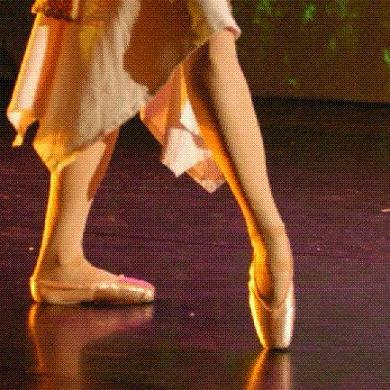To date myself and the story, it's printed by a dot-matrix printer (look here, kids) on banner paper with the holes down the side. It appears heavily influenced by The Hitchhiker's Guide to the Galaxy.
Whoever typed it up was obviously not big on copyediting, but in the spirit of preservation, I am reproducing it here exactly as found. Enjoy!
Once upon a time, in a galaxy not too far away - in fact, a galaxy very close to our own; in fact, it was OUR galaxy; anyway, there lived in a small ramshackle shack on the edge of town (Cincinnati), a man named Fred. Now, Fred spent most of his days pouring hot dogs at the local hot dog factory, and therefore did not have much money (he got a penny for every hot dog he poured and he was a very slow worker besides). Fred spent most of his nights sleeping. The nights that he didn't spend sleeping, he sat up watching Benny Hill and Archie Bunker and the LateDamnLateRealLate Show. Fred watched this trash because he was lonely. Unfortunately, Fred couldn't drown his loneliness in a bottle of Yukon Jack, simply because he had never heard of Yukon Jack. Nor could Fred afford any other recreational pharmaceuticals to hide his trouble with. So he had practically resigned himself to a life of lame T.V. and Stouffer's frozen dinners.
The one thing in life Fred wanted more than anything else was a hot babe. But, he reasoned, if he couldn't get a hot babe, he'd settle for a pet. a dog, a cat, a pet rock, ANYTHING! As long as he didn't have to feed it. Okay, that ruled out the dog and the cat. But a pet rock would be nice. It required no food, no water, no litterbox or newspapers, a little polish once in a while, and a bit of love. And it would be useful, he realized, to throw at the neighborhood kids. fred decided to go out and but himself a rock the very next day.
A thud awoke Fed. He was rather annoyed, as he had been having a very nice dream about a very hot babe name Barbie, who had been whispering "Whip me, beat me, call me BEOWULF!" At first, Fred thought the noise was the morning paper. He figured that he'd probably better go check the front porch, as he didn't get the morning paper. Fred opened the front door and stared at the ground, obviously stupefied. What made Fred blow some brain circuits was a tiny little Bundt cake, wrapped in a blanket with a note attached, which read "please take good care of my baby bundt cake." This, of course, made Fred very happy, because he would be lonely no longer. He vowed to give his baby Bundt cake the best care he could provide, and love it always. Fred had always wanted to die a happy man, and now, it seemed, his wishes would be fulfilled.
But the Bundt cake had other plans. You see, Bundt cakes grow very slowly. Their life span is the same as a human's, but they never get their growth spurt till their mid 40's. This Bundt cake was in his mid 30's, and he was a Communist spy. His mission was to find out whether the Americans were deserving enough to live, or if they were just plain silly. Sitting on top of the kitchen table, the Bundt cake (who happened to be named after the god of panic, Crises) could plainly see the T.V. and decided to tune in while Fred was at work. Crises got himself a diet Cherry Coke from the fridge and a bag of Cheetos Cheez Balls, sat back, relaxed, and got ready to enjoy a day of American television.
People screamed. Blood flew. People got trampled, run over, squashed. Panic was everywhere. One woman's eyes literally popped out of her head. This happened immediately after she saw....it. A giant Bundt cake was eating everyone it came across, getting bigger by the meal. Of course, it fed by phagocytosis, as bundt cakes don't have mounths, Total destruction seemed certain for the city. It was inevitable doom.
It was gone. It it's place sat a giant fat round Bundt cake, happy at last.
"but himself a rock"???



